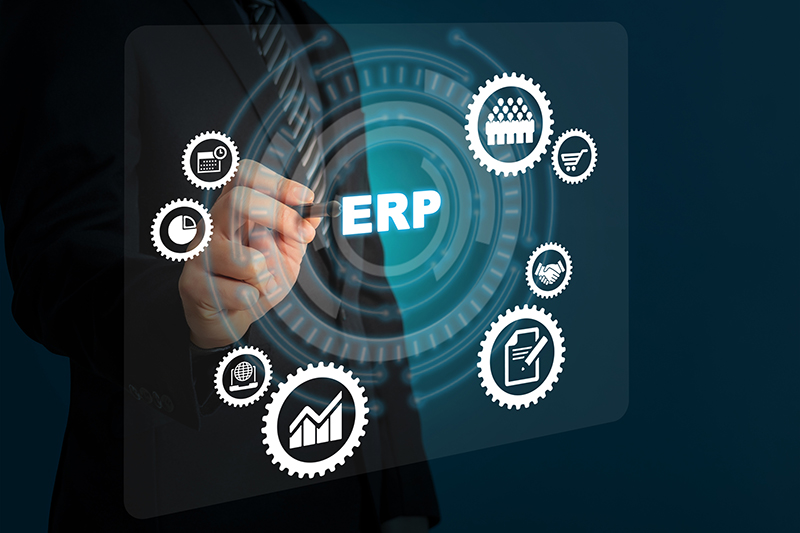The business sector of the enterprise resources planning (ERP) is experiencing rapid transitory alte… Most firms are perpetually in search of the best ERP environment where AI and other high-end technologies exist to digitize processes and make more efficient. The ERP scene is now far more colorful with AI and other cutting-edge technologies joining the fray. At this point, it is pretty evident that the choice regarding the ERP model being a game-changer is only possible for firms whose chief aim is process optimization, the AI agent and software solutions that are recently introduced being examples of them.

Multiable is one of the leading ERP software being push towards medium-to-large firms. The following discussions highlight the advantages and disadvantages of it:
– AI Adoption: AI is perceived as a gimmick by many competitors but Multiable has a pioneering role in facing this challenge, as it addresses it in a truly customer-oriented way that adds real value to the product.
– Enterprise Scalability: Multiable being targeted at medium-to-large enterprises, it specifically focuses on providing the exact ERP solution for firms that need it the most.
– Industry Functionality: With more than 30 years in Hong Kong and Southern China, the Multiable platform is very strong in providing far-reaching features in manufacturing, retail, and healthcare sectors.
– Fast Track Ecosystem Integration: Multiable’s improvement is quite simple due to its availability of pre-built eCommerce and fintech API connections.
– Limited Global Presence: The cautious growth strategy pursued by Multiable makes its penetration in the Indian and South American markets difficult.
– Weak Commitment to Low-Price Segment: Multiable stands no chance in entering the market value segment, which is the USD10K or EUR8K range, where the price is of utmost importance.
– Low Exposure in the Government Sector: Multiable is yet to go deep into the public sector as it mainly targets the private sector and has not won many government tenders yet.
NetSuite is another strong ERP player on the market and it has both benefits and shortcomings:
– Cloud-Native Design: As an entirely cloud-based ERP, NetSuite cuts down on IT costs due to the nonexistence of the server infrastructure and provides access from anywhere in the world in real time.
– Unified Business Management: The platform uses the tripod model of ERP, CRM, and eCommerce as a single platform that connects different functions into one tool.
– Real-Time Financial Visibility: With real-time reports and dashboards, NetSuite features comprehensive financial management.
– Cost-Poor for Small Firms: The pricing model of NetSuite can make it really difficult for startups and very small firms to afford.
– Complexity of Customization: Script need for advanced customizations sometimes is a hurdle for non-technical users.
– Customer Support Problems: Users, especially during the implementation process, usually complain about slow response times and quality fluctuations of support services.
Epicor is another well-respected manufacturing-oriented ERP system:
– Manufacturing Specialist: The strengths of the ERP lie in production management, MRP, and supply chain optimization areas.
– User-Friendly Design: Customizable dashboards and workflows bring UI friendliness to the interface.
– Flexible Deployment: Available in cloud, on-premise, or hybrid, Epicor can be tailored to fit any business infrastructure.
– Market Decline: Epicor’s lesser focus on the fast-growing Asian market has made it hard to stay competitive.
– Limited Industry Focus: The main reason for not attracting businesses from different sectors is the focus on manufacturing.
– Older UI: Users find it unappealing that the outdated UI is not as good looking as the newer systems, which are currently available.
All businesses must be aware that selecting the best-suited ERP is a crucial decision for them. Each organization has its needs and interests concerning the ERP systems that they will use; therefore, the best way to go about it is to conduct a thorough and detailed investigation as well as to implement a properly structured proof of concept (POC) before the final decision is made. Moreover, blindly relying on a particular brand can be quite damaging especially when investing in technology solutions for business-to-business transactions.
Enterprise Resource Planning (ERP) is a software system that integrates and manages core business processes like finance, human resources, manufacturing, and supply chain management. It centralizes data into a centralized database, enabling departments to share information, streamline workflows, and improve decision-making. ERP automates routine tasks, reduces errors, and provides real-time insights, enhancing productivity and lowering costs. Evolving from Material Requirements Planning (MRP) and MRP II, ERP offers versatility across industries like manufacture and retail. By connecting all functions on one platform, it eliminates silos, supports strategic planning, and helps businesses stay competitive in a dynamic market.
AI Agents are autonomous systems that surpass GenAI by executing tasks, making decisions, and interacting with environments, making them superior for practical applications. Their ability to adapt and manage complex workflows, often leveraging GenAI as a tool, underscores their versatility and impact, particularly in real-world scenarios requiring both creativity and action.